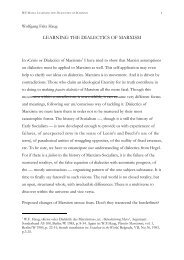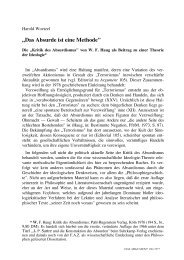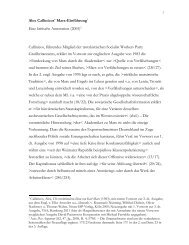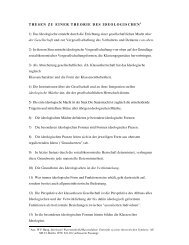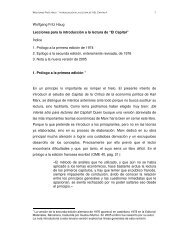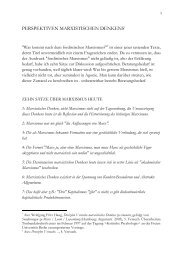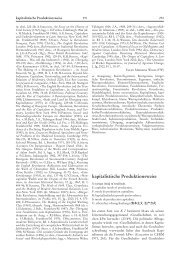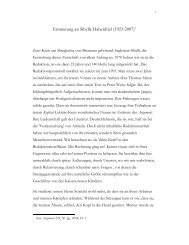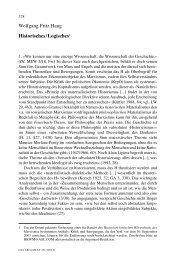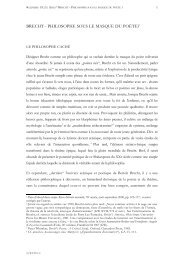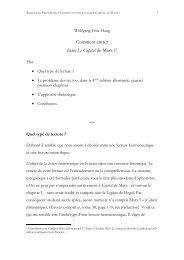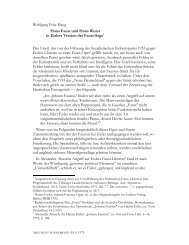HISTORISCH-KRITISCHES WÖRTERBUCH DES MARXISMUS
HISTORISCH-KRITISCHES WÖRTERBUCH DES MARXISMUS
HISTORISCH-KRITISCHES WÖRTERBUCH DES MARXISMUS
Create successful ePaper yourself
Turn your PDF publications into a flip-book with our unique Google optimized e-Paper software.
WOLFGANG FRITZ HAUG - FROM THE PREFACE TO HKWM I (1994) 1<br />
Preface<br />
to the first volume of the<br />
Historical-Critical Dictionary of Marxism 1<br />
(Extract)<br />
I<br />
This is not the first time that a new dictionary has emerged from the<br />
intention to translate, revise, or supplement a previous one. The most<br />
renowned reference book of the Enlightenment, Diderot's Encyclopedia,<br />
grew out of a translation project. Joachim Ritter's Historisches Wörterbuch der<br />
Philosophie began as a revision. The Historical-Critical Dictionary of Marxism<br />
resulted from the planning of supplementary volumes to a translation.<br />
These volumes were announced in the foreword to the German edition of<br />
George Labica’s Dictionnaire critique du marxisme in 1983. 2 They were<br />
intended to complement the French emphasis of this work with other<br />
emphases, notably German. Every critical school of thought linked to Marx<br />
was welcome among the contributions. When the project found itself<br />
blocked in then two-state Germany between dogmatic anathema on the<br />
one side and social-liberal fear of contact on the other, it became more<br />
international and, not least, sought collaboration as far as possible with<br />
intellectuals from the »tricontinent« of Asia, Africa, and Latin America.<br />
The limits of the supplement form were soon exceeded, even by the<br />
1 <strong>HISTORISCH</strong>-<strong>KRITISCHES</strong> WÖRTERBUCH <strong>DES</strong> <strong>MARXISMUS</strong>, edited by Wolfgang Fritz Haug in<br />
collaboration with near 1000 scholars. The first volume out of 15 came out in 1994 (Argument-Verlag,<br />
Hamburg); until 2008 6 more volumes appeared. Entries are in German. Foreign-language equivalents<br />
are given in Arab, English. French, Russian, Spanish and Chinese. For details see www.hkwm.de.<br />
2 Georges Labica, Kritisches Wörterbuch des Marxismus, German version, edited by Wolfgang Fritz Haug in 8
WOLFGANG FRITZ HAUG - FROM THE PREFACE TO HKWM I (1994) 2<br />
merely external fact that the supplement had grown to a length which was<br />
many times that of the original.<br />
At the same time, there were also internal reasons for this new start. A<br />
new type of problematic surfaced, in the comprehensive sense of a<br />
configuration of fields of crisis and criticism. The »Limits of Growth« and<br />
other existential problems with which the »New Social Movements« were<br />
concerned, as well as the implementation of the high-tech mode of<br />
production, all led to a progressive shifting of the questions at hand.<br />
Soviet Perestroika and ultimately, the fall of the Soviet Union and the end<br />
of the specific world order which had emerged from the October<br />
Revolution of 1917 and the victory of the antifascist East-West-Alliance in<br />
the Second World War, promoted an »epistemological break« and a drive<br />
toward historicization, pushing the dictionary project into completely new<br />
territory.<br />
Although Joachim Ritter’s Historisches Wörterbuch der Philosophie serves as a<br />
virtually unattainable example in respect to its erudition, it is a striking<br />
experience to compare scholarly contents of the two works. There are<br />
almost no points of overlap. Rather, it is as if the Historisch-kritische<br />
Wörterbuch des Marxismus (HKWM) spoke into a gaping silence, a silence which<br />
marks the discourse of the other work as bourgeois, just as the breaking of<br />
this bourgeois silence constitutes the necessity of the Marxist dictionary.<br />
After the discontinuance of the Communist experiment, historical and<br />
critical attention to the decline and fall appears of merely archeological<br />
interest to the Zeitgeist, as if »Western Marxism« and the manifold<br />
academic and cultural Marxisms of the intellectuals did not exist. Even<br />
volumes, Hamburg 1983-1989.
WOLFGANG FRITZ HAUG - FROM THE PREFACE TO HKWM I (1994) 3<br />
if this were so, and Marxism had declined and fallen, it would<br />
nevertheless remain a part of our history. The science, culture, and politics of<br />
the 20th century are impossible to understand if one does not take the<br />
Marxist challenge and the varied and antagonistic reactions to it into account.<br />
Still, any declaration of death is premature. An unfinished project cannot<br />
die, as long as the existential problems which it had begun to address have<br />
neither been solved nor rendered meaningless. Marxist thought is not an<br />
isolated nor a sectarian phenomenon. It emerged and continues to emerge<br />
from practical and theoretical attention to the problems of human<br />
socialization and social relations to nature with their antagonisms and<br />
crises. These questions concern everyone. They remain to be solved, and<br />
the fact that they have not yet been solved is increasingly perceived as a<br />
question of the survival of humankind on »Spaceship Earth,« even as the<br />
scope of these questions is barely understood.<br />
Just as the history of Christianity was not ended by the fall of early<br />
Christian rule, so too has the theoretical and practical search for a model<br />
of socialization based on the principles of solidarity and environmental<br />
soundness not been ended by the fall of Communist rule. The crimes<br />
committed in the name of socialism can no more erase the ethical and<br />
political-economic substance of the socialist idea than the immense crimes<br />
committed in the name of Christianity could erase the Christian ethical<br />
impulse.<br />
Joachim Ritter wrote in the foreword of his Wörterbuch that, »it cannot be<br />
predicted, what a new synthesis will one day look like nor whether or not<br />
it is already at work«. This sentence could also be applied to Marxist<br />
knowledge on the threshold of the 21st century. From the current body of
WOLFGANG FRITZ HAUG - FROM THE PREFACE TO HKWM I (1994) 4<br />
knowledge, it is just as impossible to predict which separate elements will<br />
one day be taken up again and in what combination they will appear.<br />
This fissured knowledge shot through with manifold antagonisms, this<br />
knowledge with its insights and blind spots, presumptions and experiences,<br />
refuted hypotheses and points of unrealized potential, is the chaotic and<br />
immeasurable material of the historical-critical dictionary. It is obvious that<br />
this material can never be exhaustively represented, and that any<br />
representation is only excursively possible from a restricted standpoint.<br />
Additionally, a clear demarcation of the material would have been<br />
senseless, the more so since it is in communication with European<br />
traditions and since the checkpoints between Marxist and »bourgeois«<br />
knowledge were always open, even if often traversed incognito by both<br />
sides. The exhibition of models of thought, conceptual tools, and<br />
delineation of thought processes opens up connections in every direction<br />
and demonstrates possible sites of interaction.<br />
II<br />
The current historical constellation is both favorable and adverse for the<br />
project of a historical-critical dictionary of Marxism. The collapse of state<br />
Marxist censure of re-flection on the past is favorable. The archives are<br />
open and the theories ownerless. The antihistorical clutch of the »victor«<br />
after the history is adverse: it equals in many ways an erasure of social<br />
memory. The post-Communist situation thus imprints the topic headings<br />
of »historical« and »critical« with an emphatic relevance to the present-day.<br />
These headings address the critical (and self-critical) evaluation of
WOLFGANG FRITZ HAUG - FROM THE PREFACE TO HKWM I (1994) 5<br />
historical experience on the one hand, and the scientific survey,<br />
development, and critical examination of an enormous theoretical corpus<br />
on the other. A historical-critical look into the labyrinthine »library« of<br />
Marxist knowledge can help effect a curative return to one's senses. The<br />
process of remembering with critical examination may even contribute to<br />
the dissolution of what Sigmund Freud has called the »blind compulsion to<br />
repeat«.<br />
The demise of Marxism-Leninism left behind an accumulated historical guilt<br />
in the common memory of the peoples. Its counterpart is an enormous<br />
mountain of rubble from the fallen system which threatens to bury<br />
indiscriminately the rational elements and the seeds of the future which the<br />
system contained along with its irrational and lethal elements. This situation<br />
forces Marxist thought, in order to survive, to deal with the stress and pain of<br />
the negative in the form of what Marx called »ruthless criticism«<br />
(rücksichtslose Kritik). It is the only way to save a human patrimony of<br />
enlightening knowledge and social imagination from being lost in the<br />
wreckage. Retrieving criticism alone, of which Walter Benjamin wrote, is able<br />
to carry as a new Noah's Ark these treasures into a different time.<br />
This kind of criticism is also negative, it can hurt, but it never tacitly<br />
pretends to be beyond that which it criticizes. Instead it opens up to<br />
historical experience, and by concerning itself with the particulars of this<br />
experience, is able to accept them. This criticism does not lay claim to the<br />
last word but rather upsets the combination of dismal silence and shortsighted<br />
triumph.<br />
The necessary attempt to do justice historically to the object of criticism<br />
will not always succeed. Nevertheless, it must be made. To »know
WOLFGANG FRITZ HAUG - FROM THE PREFACE TO HKWM I (1994) 6<br />
everything better« as it regularly emerges after a defeat is not necessarily<br />
indicative of superior knowledge. Often enough, it is just another form of<br />
the inability to accept correction. A simple change of sides after the state<br />
socialist catastrophe flees from responsible examination into amnesia.<br />
One need not recall only the examples of opportune changes of<br />
convictions after the failure of the Soviet attempt at reform and<br />
democratization. De-Stalinization had already produced similar cases. In<br />
1956, when Nikita S. Khrushchev pilloried the crimes of Stalin, which was<br />
equivalent for the Communist experiment to being »released on<br />
probation«, a probation which was forfeited no later than 1968 with the<br />
suppression of Czechoslovakian Reform Communism, Henri Lefebvre<br />
remarked that it was »the fashion among Marxists to mock quotation as<br />
›the shortest path respectively from one thought to another‹.« He<br />
continues, »This fashion was created exactly by those who had never<br />
previously written a line or spoken a sentence without quoting Stalin<br />
themselves. Today their ignorance and the emptiness of their thought is<br />
concealed in a different manner.«<br />
Without social memory, experience cannot exist. A historical-critical<br />
dictionary in times of a »historical break« (Peter Glotz) is significant insofar<br />
as it is a part of the process of remembering that mediates intellectual<br />
experiences. These intellectual experiences are made up of historical-critical<br />
»quotation«, not only of the sort which displays brilliant achievements but<br />
also of the sort which exposes the theoretical emptiness of thought enamored<br />
of power.
WOLFGANG FRITZ HAUG - FROM THE PREFACE TO HKWM I (1994) 7<br />
III<br />
This HKWM has a strong philological emphasis, in addition to its<br />
emphases on practical criticism and relation to experience. All quotes from<br />
and references to sources have been carefully recorded in the articles, in<br />
order to assist further independent work and offer Ariadne's threads as a<br />
guide through the labyrinths of the library. There are also pointers to be<br />
found as to which works merit new readings in order to make history less<br />
fetishistic. The histories the terms can tell in their multiple usages and<br />
connotations operate subversively against false certainties and seemingly<br />
immovable edifices of thought.<br />
The organizational structure of a dictionary of concepts seemed the most<br />
suitable for this project, which is intended to lead to an open workshop<br />
atmosphere rather than a closed-minded Weltanschauung. While the idea of<br />
an encyclopedia assumes control over discrete spheres of knowledge<br />
which interconnect like the links of a chain, this dictionary philosophizes<br />
with a hammer, in that it shatters the spheres of thought into individual<br />
terms. The over-arching meaning is not given. The imaginary control over<br />
this over-arching meaning should yield to the deconstruction of<br />
hermeneutic totalities. This theoretical reworking of »philosophical<br />
grammar« may aid in the introduction of Marxist knowledge into a new<br />
»reflexive modernity« enlightened by historical materialism, a modernity in<br />
which the unified myths of the subject and meaning have dissolved and<br />
which is consequently able to take up the project of critical social theory<br />
anew.
WOLFGANG FRITZ HAUG - FROM THE PREFACE TO HKWM I (1994) 8<br />
IV<br />
The dictionary addresses over 1500 conceptual terms which have become<br />
relevant to Marxism and to social liberation movements within their distinct<br />
theoretical and practical lines. The theoretical and politically strategic terms<br />
which had become particularly meaningful to Marx and Engels and to the lines<br />
of thought connected to them were the first to be included. However, terms<br />
unknown to the Marxist classics or even the Marxist traditions, or, at the very<br />
least, not native to these traditions were also included. This seemed to be the<br />
right choice with terms in which historically new problematics and<br />
epistemological claims are articulated or terms which illuminate previously<br />
neglected facets of Marxism.<br />
Many of these entries derive from present political-theoretical vocabulary and<br />
have never before been addressed in comparable dictionaries. In these entries,<br />
many of which are newly coined, the problems of this epoch are articulated.<br />
They are the unsolved questions of an epoch of global crises: the transition to<br />
the high-technological mode of production of trans-national capitalism, the<br />
failure of the Soviet social formation which was determined by the structural<br />
inability to keep up with this transition, and the explosion of the North-South<br />
conflict in world capitalism once it was no longer held in check by the East-<br />
West opposition. Last but not least, the new social movements, most<br />
importantly feminism and the environmental movement, helped shape this new<br />
vocabulary.<br />
Even in places where the words are not new, the readings certainly are, in that<br />
their interpretative questions are the questions of the time.<br />
Historical events, geographical designations, and the names of organizations
WOLFGANG FRITZ HAUG - FROM THE PREFACE TO HKWM I (1994) 9<br />
have not been included, except in cases where they have become expressions in<br />
which strategic problems and reflections thereof are condensed. Names of<br />
persons appear only in the designations of critical directions or schools which<br />
originated with them.<br />
Metaphors, images, topoi, catchwords etc. are accepted whenever they have<br />
become important for theoretical-political articulations. Ritter doesn’t accept<br />
them, even though he knows together with Hans Blumenberg that they »lead<br />
to the substructure of thought«.<br />
Terms which have a »split« history appear in a few cases as double entries<br />
under the possible variant designations. The resulting polyphony and<br />
plurality of perspectives is welcome. It leads into the center of the field of<br />
Marxism in its unfinished history.<br />
[…]<br />
Berlin, autumn 1994<br />
Wolfgang Fritz Haug<br />
Translated by Elizabeth C. Penland



